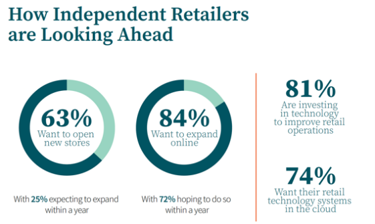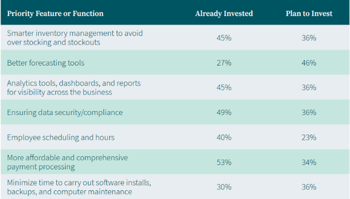Epicor Study Shows Ambition Across Independent Retailers And The Technology To Drive It
By Carl Hildebrandt, Epicor

Over the past few years, consumer expectations continue to trend toward eCommerce, personalization, efficiency, and more that require digital transformation within their favorite local brands. While the technology to meet those expectations is readily available to all independent retailers today, Epicor found that many do not invest in these capabilities in comparison to larger competitors. However, we also know that these businesses are ready to begin their journey toward a digital transformation.
April of 2020 began the fastest digital transformation the retail industry has ever experienced. That month, only 6.6% of U.S. retail chains offered curbside pickup, by February 2021, 50.7% of them did. And the transformation has not stopped there. Despite the massive upheavals, a recent survey* among Epicor’s customer base of independent retailers revealed there is a real sense of optimism about the future, including 81% of Epicor’s independent retailers looking to invest in the technology to improve their retail operations.
 While the catalyst for this change may have been the pandemic, it brought an opportunity to improve digital integrations that unite online and in-person customer experiences, as well as refine curbside and e-commerce services. The study shows that the majority of independent retailers are now either already investing in key capabilities – or plan to soon.
While the catalyst for this change may have been the pandemic, it brought an opportunity to improve digital integrations that unite online and in-person customer experiences, as well as refine curbside and e-commerce services. The study shows that the majority of independent retailers are now either already investing in key capabilities – or plan to soon.
Guideposts On The Road To Transformation
Whether you’ve already made the move to introduce new tools or are preparing to, here are 4 key areas that will help you prioritize digital transformation efforts and deliver measurable results.
- Inventory Management Is Critical
Supply chain issues are a key concern cited by independent retailers and it has never been more important to know what’s moving and what’s not. The retail inventory management software can bring a centralized view of all of this despite geographical location. Tracking all your products in real time is critical to managing the flow of goods until they reach customers.
- Analytics Power Retail
Combining predictive analytics with the close connections independents have with their customers can set retailers apart from the competition. Two key drivers of this are:
- Forecast product demand: Retailers can assess demand and sales performance by using a ranking to ‘grade’ a product’s performance based on indicators like sales margins and number of units sold. While forecasts are predictions based on actual sales history, using the two capabilities together helps retailers stock items more optimally based on overall store profitability and revenue. It also will help customers have a positive omni-channel experience as retailers can ensure the same inventory is available online and at their physical store location(s).
- Market basket analysis: The ability to analyze purchases for trends can help retailers plan promotions, pricing decisions, end caps, and more. With market basket analysis, retailers can identify products commonly purchased together and make better pricing decisions.
- The eCommerce Opportunity
Most independent retailers (57%) operate a single physical store but are aware of the potential threat from online competition. Make sure your business has an online store that isn't just a default convenience. To stay competitive with web-based retail giants, retailers need to offer their superior products and customer service, along with the digital convenience their customers expect. This is where investing in a retail management system will pay dividends as SMBs can pair their e-commerce offer with services online retailers can’t provide.
- Consider The Cloud
The cloud is increasingly recognized as the platform to run key business operations, with 74% of independent retailers wanting their technology systems in the cloud*. There are clear benefits to this approach – monthly costs are predictable, upgrades are automatic, and ongoing maintenance is no longer the retailer’s responsibility. It’s also more secure, with encrypted data, off-site backup, and automatic security updates to protect your retail operation.
- Mind The Gap
Closing the digital gap will deliver significant benefits that will give independents the agility, visibility, and features to compete with other physical and online retailers. Using complete retail solutions, independents can deliver the flexibility customers have come to expect from both their in-store and digital experiences.
---
*The 2021 Epicor Retail Survey was conducted by an independent research organization, Lucid, in September 2021. There were 208 total respondents working in U.S.—based retail at a manager level or above. There were 105 independent retailer respondents and 103 respondents who represented retail corporations or publicly-trading retail companies.
About The Author
Carl is the Vice President Product Management at Epicor, where he has worked for over 14 years. He is a Strategic Product Manager with proven success in bringing transformational products to market that solve pervasive market problems and accelerate business growth.
